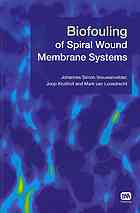

Most ebook files are in PDF format, so you can easily read them using various software such as Foxit Reader or directly on the Google Chrome browser.
Some ebook files are released by publishers in other formats such as .awz, .mobi, .epub, .fb2, etc. You may need to install specific software to read these formats on mobile/PC, such as Calibre.
Please read the tutorial at this link: https://ebookbell.com/faq
We offer FREE conversion to the popular formats you request; however, this may take some time. Therefore, right after payment, please email us, and we will try to provide the service as quickly as possible.
For some exceptional file formats or broken links (if any), please refrain from opening any disputes. Instead, email us first, and we will try to assist within a maximum of 6 hours.
EbookBell Team

4.4
62 reviewsHigh quality drinking water can be produced with membrane filtration processes like reverse osmosis (RO) and nanofiltration (NF). As the global demand for fresh clean water is increasing, these membrane technologies are increasingly important. One of the most serious problems in RO/NF applications is biofouling - excessive growth of biomass - affecting the performance of the RO/NF systems. This can be due to the increase in pressure drop across membrane elements (feed-concentrate channel), the decrease in membrane permeability or the increase in salt passage. These phenomena result in the need to increase the feed pressure to maintain constant production and to clean the membrane elements chemically. This book relates biomass accumulation in spiral wound RO and NF membrane elements with membrane performance and hydrodynamics and determines parameters influencing biofouling. It focuses on the development of biomass in the feed-concentrate (feed-spacer) channel and its effect on pressure drop and flow distribution. It can be used to develop an integral strategy to control biofouling in spiral wound membrane systems. Most past and present methods to control biofouling have not been very successful. An overview of several potential complementary approaches to solve biofouling is given and an integrated approach for biofouling control is proposed.